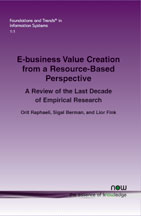E-business Value Creation from a Resource-Based Perspective: A Review of the Last Decade of Empirical Research
By Orit Raphaeli, Ben-Gurion University of the Negev, Israel, oritrap@post.bgu.ac.il | Sigal Berman, Ben-Gurion University of the Negev, Israel | Lior Fink, Ben-Gurion University of the Negev, Israel
Abstract
The value of e-business technologies, namely, the organizational performance impacts of implementing Internet-based information technology (IT) in the supply chain context, has been the theme of recent literature in both information systems and operations management disciplines. Yet the findings reported in this literature reflect a certain inconsistency that can be attributed to variability in the conceptualization of key constructs and relationships. The central goal of this review was to systematically analyze survey-based studies that have reported on the relationship between e-business technologies and organizational performance to detect possible sources for the similarities and differences in reported findings. We drew on the resource-based view of the firm to guide our analysis, relying on Melville et al.'s 2004 integrative model. We applied this model to consolidate the various strands of research, to synthesize the current knowledge about e-business value, and to guide future research by developing propositions and suggesting future research directions.
This review reveals that definitions and measurements of the key variables used to evaluate the main concepts of e-business value differ markedly across the relevant literature. However, despite these differences, the papers reviewed generally agree that e-business technologies are valuable, mostly through their facilitation of Internet-enabled supply chain integration capabilities. The nature and magnitude of value are dependent on internal and external factors. The conclusions drawn from the literature review provide a basis from which further research on the organizational performance impacts of e-business technologies can be developed, both to define its main concepts and to construct its theoretical basis.
E-business Value Creation from a Resource-Based Perspective:
E-business Value Creation from a Resource-Based Perspective analyzes and integrates various perspectives on the impact of e-business technologies on supply chain practices and performances. Relying on the resource-based view (RBV) of the firm, the authors designed a comprehensive conceptual framework within which to examine the performance implications of e business technologies. This framework can be used to compare e-business technologies to other types of information technology (IT), and it can also function as a tool for further investigations into supply chain management (SCM) relationships.
